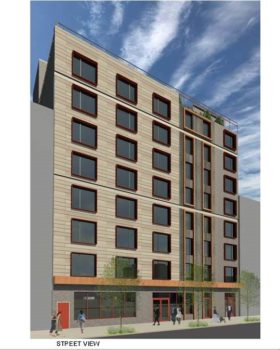
Rendering of the 776-780 Myrtle Avenue development as presented throughout the ULURP process; however, there may be minor aesthetic changes made. / Image Credit: Urban Architectural Initiatives
The new nine-story building would bring approximately 36 housing units for the formerly homeless. On October 17, 2019, the City Council voted to approve a land use application to facilitate the construction of a new nine-story mixed-use residential and commercial building on three vacant City-owned lots at 776-780 Myrtle Avenue in the Bedford-Stuyvesant neighborhood of Brooklyn. To facilitate the project, the application asks for two land use actions. First, the three City-owned vacant lots will be transferred to IMPACCT Brooklyn to develop the building. Second, the development will take advantage of the Urban Development Action Area Program property tax exemption for new development on formerly City-owned land. The Department of Housing Preservation and Development, IMPACCT Brooklyn, and Urban Architectural Initiatives are the applicants.
On August 28, 2019, the City Planning Commission voted to approve the application. For CityLand’s prior coverage on this decision, click here.
On September 18, 2019, the City Council Subcommittee on Landmarks, Public Siting, and Maritime Uses held a public hearing on the application. Lacey Talbert of the Department of Housing Preservation and Development and Andrew Murray of IMPACCT Brooklyn presented the application.
Talbert stated that the new nine-story building will have 59 affordable housing units and a superintendent’s unit. The building will be developed under HPD’s Supportive Housing Loan Program, which funds the rehabilitation and new construction of supportive housing for the formally homeless and people with disabilities. Projects under the program must set aside 60 percent of units for the formerly homeless, individuals with disabilities, or homeless families with a disabled head-of-household. Under the supportive housing loan program regulations, approximately 36 studios will be affordable for formerly homeless individuals over age 55 and tenants will pay up to 30 percent of their income for rent.
The remaining units, which are approximately 23 units, will be set aside for households earning up to 60 percent area median income (AMI) or approximately $44,820 dollars for a one person household or $57,660 for a three person household. The expected rents would range from $843 for a studio to $1290 for a two-bedroom.
The applicants are planning to apply for the Low Income Housing Tax Credit which is awarded to new construction for low-income housing. Applicants who apply for the tax credit must meet one of three set-aside options. The applicants are considering the income averaging option, which was recommended by Borough President Eric L. Adams and the local community as a way to deepen the housing units’ affordability. Income averaging requires that the remaining 23 units meet an average household income limit of no more than 60 percent AMI. By having an average household income limit, the option allows the units to be set aside to households making between 40 percent AMI or approximately $28,880 for a one person household and $38,440 for a three person household and households making 80 percent AMI or approximately $59,760 for a one person household and $76,880 for a three person household.
As explained to CityLand by the Furman Center on Real Estate and Urban Development, using the income averaging option allows the project to reach a broader range of incomes and to have a more financially sustainable development without compromising affordable homes. Although without income averaging the applicants would only be asked to target incomes 60 percent AMI or less, they would not have an incentive to set aside units for AMIs considerably lower than 60 percent. By allowing developers to go up to 80 percent AMI, the income averaging option would force developers to also set aside units for as low as 40 percent AMI while allowing the project to be financially sustainable.
The building will also have a 3,000 square feet ground-floor commercial space and an on-site social services space in the basement. Andrew Murray noted that the applicants are considering Grand Lo Café, a non-profit social enterprise café that provides workforce development training, as the commercial space tenant. IMPAACT Brooklyn would provide supportive services such as substance abuse counseling and harm reduction programs for the on-site social services space.
The building amenities include a shared rear courtyard, community room, laundry room, and storage room. The building will have sustainability features under Passive House Standards such as a green roof and solar-paneling. In response to Council Member Inez Barron’s question about the solar-paneling’s energy, Murray stated that the panels will provide about 35 to 45 kilowatt of energy and will most likely provide electricity for the building’s common areas.
The Council Subcommittee voted to approve the application on October 3, 2019.
On October 10, 2019, the City Council Land Use Committee voted to approve the application and the City Council voted to approve the application at the October 17, 2019 stated meeting.
By: May Vutrapongvatana (May is the CityLaw Fellow and New York Law School Graduate, Class of 2019).

